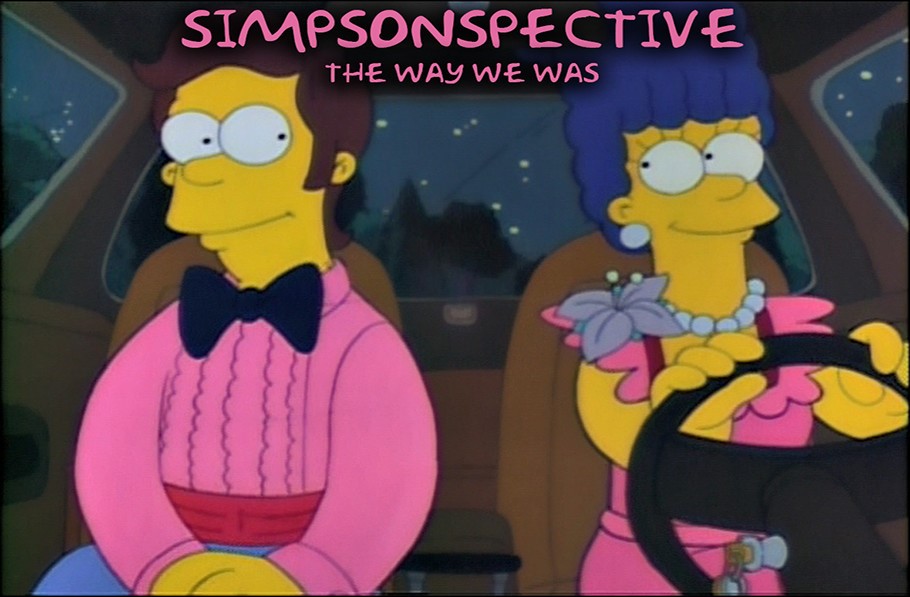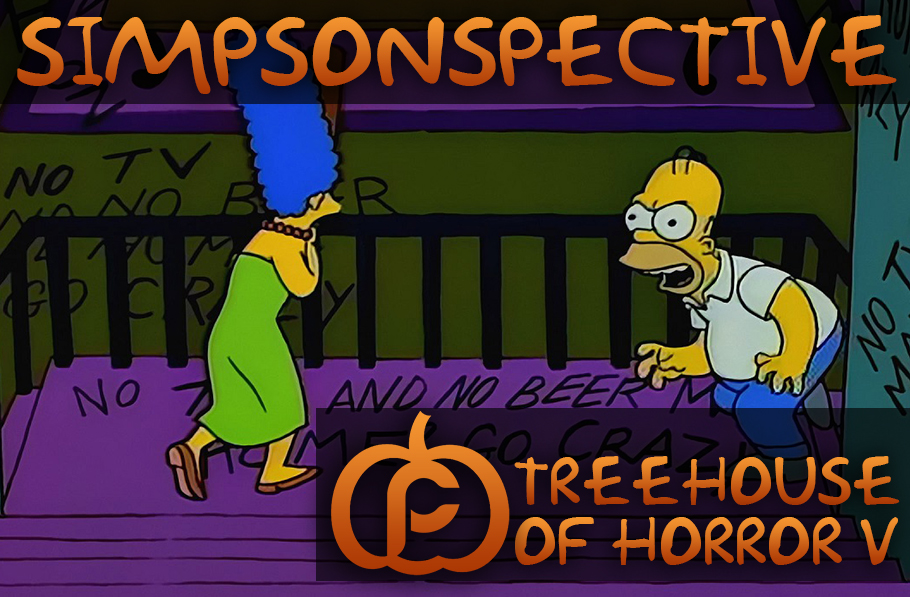Marge Be Not Proud | Simpsonspective
Richard Petro / 24 December, 2017
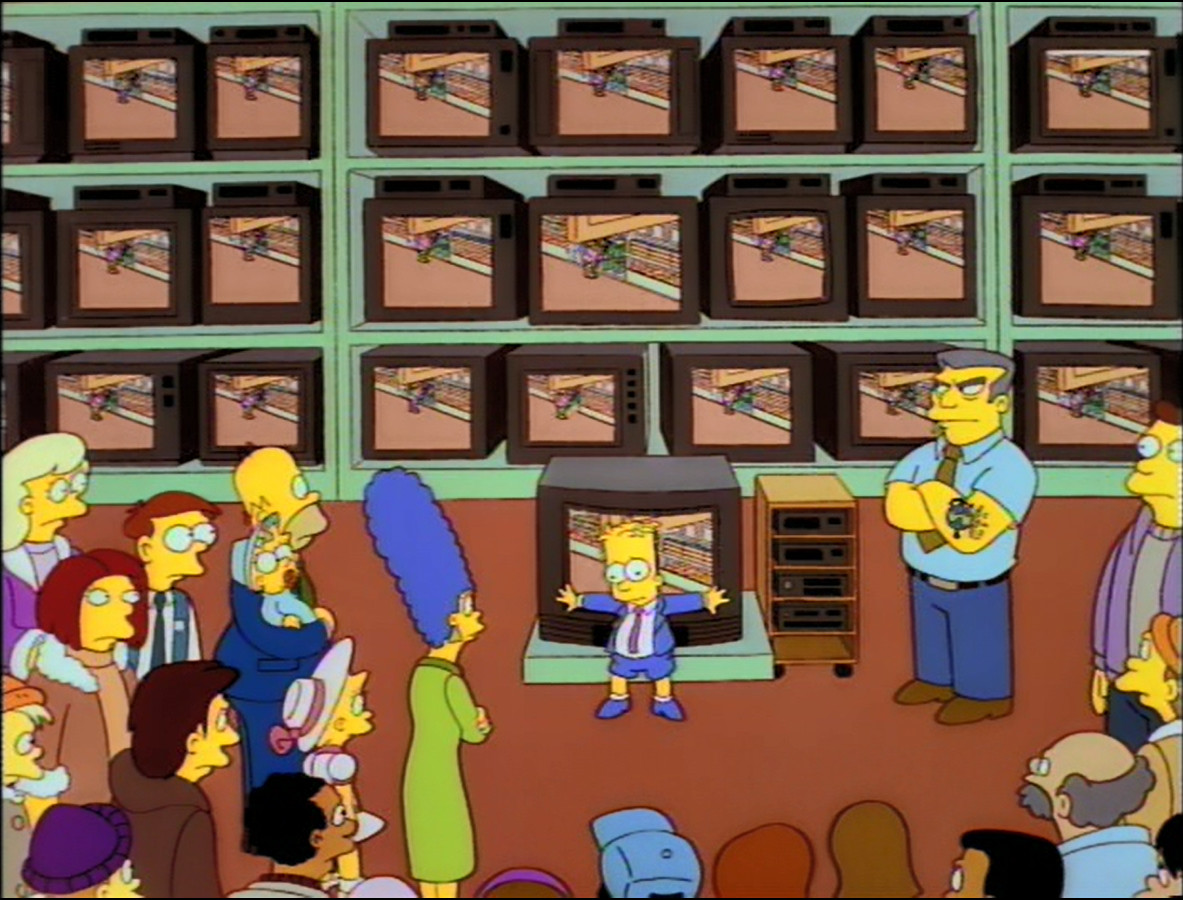
- Directed by: Steven Dean Moore
- Written by: Mike Scully
- Airdate: December 17, 1995
It’s almost Christmas and Bart’s attention is drawn to a new videogame by the name of Bonestorm. Unfortunately, Marge feels as the game is too violent and refuses to buy it for him. Feeling jealousy over Milhouse having the game, Bart decides that maybe standing in front of the games at the Try ‘n Save and looking sad will make someone buy it for him. After Jimbo and Nelson come by, showcasing their ‘four-finger-discount’ take, Bart sticks a copy of the game in his jacket but is caught as he gets outside. Security guard Don Brodka scolds Bart before leaving a message on the answering machine for his parents, leaving Bart to race them home to change the tape. The next day, Bart’s day is ruined as Marge informs him that they are going to the Try ‘n Save for a family photo. As the picture is taken, Brodka arrives and pulls Bart from frame, revealing to the family (and everyone else there) that Bart had been caught for shoplifting. At home, after Homer has yelled at him, Bart attempts to converse with his mother, to no avail. Marge talks to Homer about how she feels that she may have babied Bart too much, and decides to start treating him more like an adult. Feeling as though his mother’s affection has been lost by his actions, Bart attempts his best to makes things better, even helping Milhouse’s mother as she gets Christmas cards ready for mailing in an attempt to prove himself to himself. With things seemingly not making any progress, he re-enters the Try ‘n Save. Returning home, Bart is cornered by Marge as he is obviously hiding something in his jacket. He hands over the photo he had taken of himself, with a receipt stating he has paid for it. He tells her it was going to be her Christmas present, making things right with Marge and having her return to showcasing her affection and treating him like her ‘special little guy’. Since she got to open her gift early, she hands Bart the gift she got him; Lee Carvallo's Putting Challenge. It isn’t the game that he wanted, and he’s slightly disappointed, but Bart, knowing it doesn’t matter, thanks her and the two hug as the episode comes to an end.
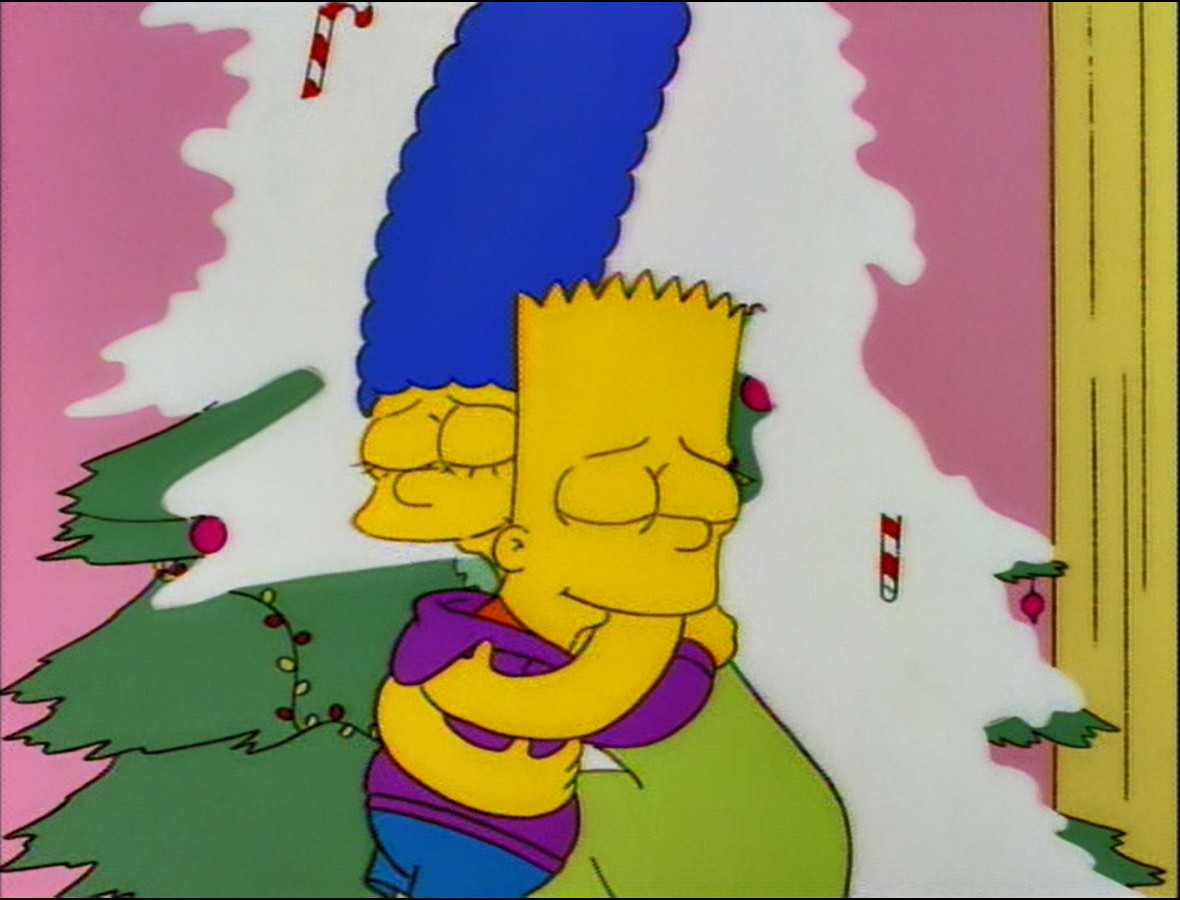 The eleventh episode of the seventh season brought us only our second Simpsons Christmas special, the reason being that, as stated by Bill Oakley, the writing staff didn’t want to tackle another Christmas themed episode because of the high standard set by the classic that was the first-ever Simpsons episode.
Based on writer Mike Scully’s own childhood experience, to an extent (his parents never found out, his father only doing so once he was a grown man), Marge Be Not Proud is sweet, touching, and fantastic, especially in the way it realistically explores ways an event such as this could affect relationships within a family, and how different people and personalities would react themselves.
The eleventh episode of the seventh season brought us only our second Simpsons Christmas special, the reason being that, as stated by Bill Oakley, the writing staff didn’t want to tackle another Christmas themed episode because of the high standard set by the classic that was the first-ever Simpsons episode.
Based on writer Mike Scully’s own childhood experience, to an extent (his parents never found out, his father only doing so once he was a grown man), Marge Be Not Proud is sweet, touching, and fantastic, especially in the way it realistically explores ways an event such as this could affect relationships within a family, and how different people and personalities would react themselves.
The Simpsons was always incredible and untouchable when it came to its humour, but the show was always at its best in its drama and character explorations. Pulling stories and depth from instances that were rooted in real life made for some of the best episodes, and adding something as simple as the Christmas holiday setting makes this an episode I feel deserves more conversation.
There has always been the constant age-set of The Simpsons, and it’s something that has worked well in the favour of the writers when it comes to exploring different aspects of the children, especially. They can go through different phases and cycles true to their character. Lisa is incredibly smart; we can explore her feeling underappreciated, like she doesn’t really belong, and making mature decisions for her age like her vegetarianism or becoming a Buddhist. Bart is a troublemaker, and we can explore him feeling trouble, taking things such as the possibility of being left behind seriously, finding something he’s good at, showing more heart in way people wouldn’t expect, or fall victim to choices that aren’t smart but are still understandable. That’s possibly the most important moment of the episode that is handled incredibly well. Bart’s decision to shoplift comes from selfishness and stupidity, but it’s never a decision that makes him antagonistic. The fact that the episode is told from his perspective, for the most part, connects us to him, giving us time to reflect on any dumb decisions we may have made when we were young, things we look back upon and shake our heads at wondering what we were thinking. But it’s all a part of life, of learning and growing. Bart doesn’t scheme to shoplift, instead opting to make it a sudden choice that he doesn’t give much thought to at all. While Bart has been a troublemaker, he has never been one to delve into full on law-breaking like the local bullies, ones we see prior to Bart’s decision obviously having done enough shoplifting to be decent at it. Bart does have a conscience that same way we all do; he knows when things are serious, and this just so happens to be a case of a really bad decision that blows up in his face. Would Bart have regretted stealing if he got away with it? Knowing his character, I believe he would. Throwing Bart into the seriousness of the situation happens immediately as he comes face to face with security guard Don Brodka, wonderfully voiced by notorious Hollywood tough-guy Lawrence Tierney. Brodka shows no sympathy or attempt at empathy, and why should he? He’s here to do his job. The encounter makes Bart realize the graveness of the situation right away, feeling honest regret and fear, especially once the thought of his parents finding out comes to light. The rule of life is that things that have been done wrong will almost always come to light, and it’s always true in The Simpsons universe. Suddenly the seriousness of the crime is washed away from Bart by the thought of how his parents would react, as he races home to replace the message left by Brodka. The eventual build of stress and tension once the family visits Try ‘n Save and the subsequent reveal are both masterfully done; the reveal with the multiple televisions behind Bart showing his crime adding a small tinge of comedy that also makes the moment more heartbreaking and sad. We see Homer and Lisa react with obvious shock, but the focus ends squarely on Marge, heartbroken and saddened.
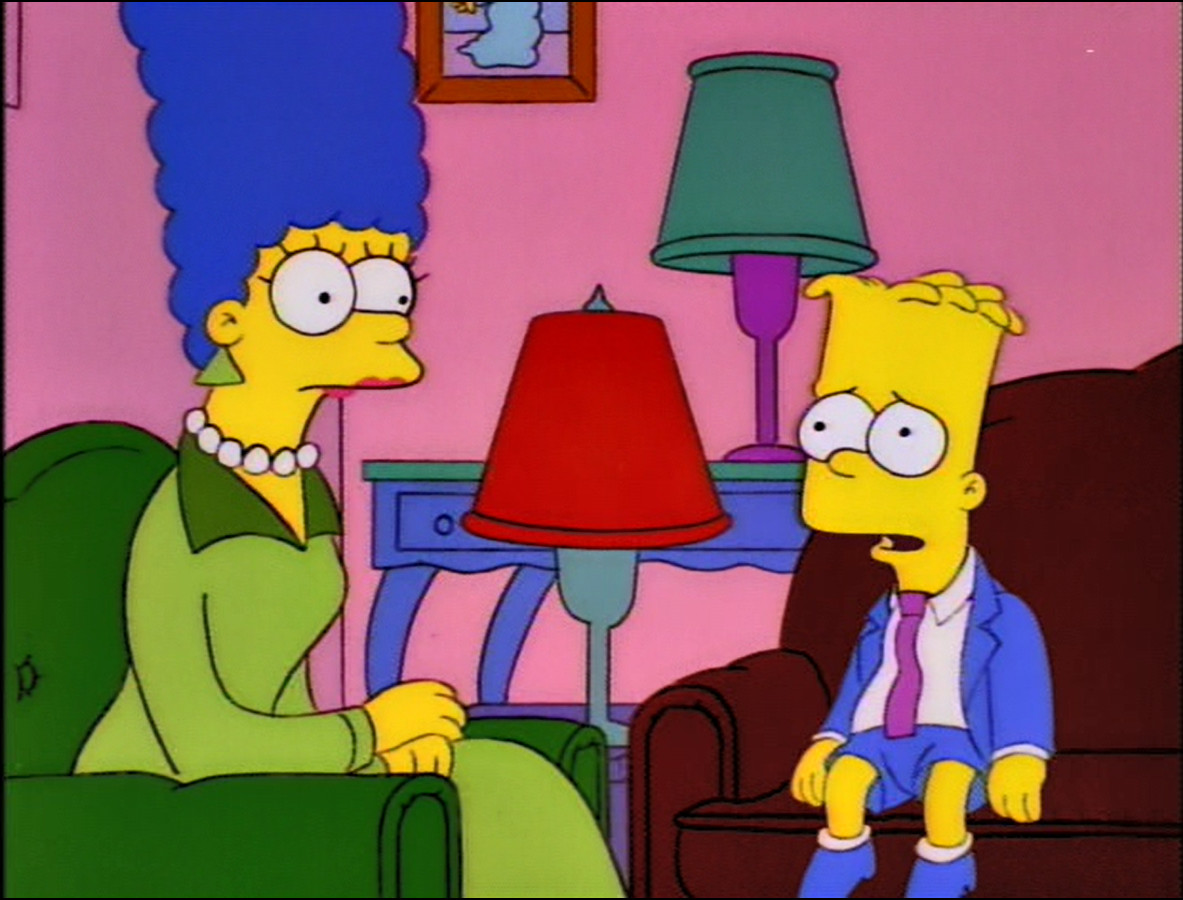 On the commentary for the episode (and if you have the DVDs and haven’t listened to any of the commentaries, do so, they’re all incredible), the crew talks about the real truth that situations like this lead to, and which becomes the focal point of the remaining time. As a kid, there’s nothing worse than feeling as though you’ve disappointed your parents. Anger is one thing, but not one that carries the same level of gravitas. There’s yelling and grounding and anything else, but anger eventually passes. With anger you have the knowledge that once the initial blow-up happens, you’re out of the worst for the moment. Disappointment is more painful because it’s quiet and internal. It’s a slow and deep cut to the heart. Marge, the one who has the kindest heart, believes in her children and epitomizes motherly love to the point of jokingly being referred to as ‘lame’ repeatedly by someone like Bart, is devastated.
The initial shock is followed by the moment at home. Homer has said his piece, and that leaves us with Marge and Bart. Marge’s quiet sitting, hands on legs and faraway stare as she obviously has a lot running through her mind is painful. In these few seconds, we get everything we need in regards to the emotions of the episode. We feel Marge’s pain and heartbreak. Bart’s attempt to speak to her and apologize, with her short, almost cold, response, adds to it while also laying out how serious Bart takes the situation. He knows how Marge feels, and it hurts him to have hurt her the way he did.
On the commentary for the episode (and if you have the DVDs and haven’t listened to any of the commentaries, do so, they’re all incredible), the crew talks about the real truth that situations like this lead to, and which becomes the focal point of the remaining time. As a kid, there’s nothing worse than feeling as though you’ve disappointed your parents. Anger is one thing, but not one that carries the same level of gravitas. There’s yelling and grounding and anything else, but anger eventually passes. With anger you have the knowledge that once the initial blow-up happens, you’re out of the worst for the moment. Disappointment is more painful because it’s quiet and internal. It’s a slow and deep cut to the heart. Marge, the one who has the kindest heart, believes in her children and epitomizes motherly love to the point of jokingly being referred to as ‘lame’ repeatedly by someone like Bart, is devastated.
The initial shock is followed by the moment at home. Homer has said his piece, and that leaves us with Marge and Bart. Marge’s quiet sitting, hands on legs and faraway stare as she obviously has a lot running through her mind is painful. In these few seconds, we get everything we need in regards to the emotions of the episode. We feel Marge’s pain and heartbreak. Bart’s attempt to speak to her and apologize, with her short, almost cold, response, adds to it while also laying out how serious Bart takes the situation. He knows how Marge feels, and it hurts him to have hurt her the way he did.
The build of the remaining episode, on both sides, is wonderfully contradictory while remaining faithful to real-life. Marge realizes that maybe her ”special little guy” isn’t so little anymore, opting to start treating him less like a child and more like his own person without coddling him. Meanwhile, Bart desperately seeks ways to not just get back into his mother’s good graces, but to prove himself as worthy of the love from her he feels he may have lost. Though the majority of the episode is from Bart’s eyes, this is where a branching of perspective makes an already effective episode even more-so. Marge’s conversations with Homer about her feelings as though she has lost Bart through babying him too much and the fact that she shouldn’t anymore intertwines, and fuels, Bart’s own perspective. Marge’s decisions are completely understandable; a parent attempting to put the pieces together of what may have went wrong and blaming themselves in some child’s own personal choices. Marge’s attempts to treat her son more like an adult doesn’t come off as such in his eyes. A call-back to the tuck-in express, with Marge simply saying a blunt good night to Bart comes off cold and unloving to him, the sudden pull-back of what he is used to from his mother feeling like massive distance between them. He is suddenly struck by realization of what he has taken for granted. His road to proving himself to his mother and earning her trust once again also dips into almost a need to prove himself to himself. The moment between him and MIlhouse’s mother may seem like it isn’t as important as the rest of the running time, but it leads to a single line that sums up so much of Bart in this episode. He attempts some normal familial activity, helping Luanne with her Christmas cards. After an awkward line and pause, he reaches out to her and says; “Tell me I’m good.” It works as a punchline to the scene, but it’s also so much more. It is at once sad, pathetic, and filled with a sense of begging, of hope, of some desperate reach for reassurance. At the same time, the line and the desperate need for positive feedback is understandable.
The climactic moment of the episode is built to in a way that makes something so small seem so important. The entire lead-up to the family knowing of Bart’s actions come from a trip to the store where Marge hopes for a nice family photo, one that has always seemed to allude her (mostly due to Bart’s pranks). Hanging the photo on the wall, with Bart being yanked away during the shot, immediately tilts to one side, uneven. Things aren’t the same in the household. In the finale, we are treated to a more straightforward, yet incredibly affective, use of Bart’s POV when it comes to his mother. Returning home after we see him angrily march into the Try ‘n Save again, he is obviously hiding something. Marge moves after him and, after Homer blocks the way, we see her from Bart’s angle; staring down, distrusting and frustrated. Bart’s gift, a nice photo of himself paid in full, immediately seems to make it all okay. He knows how much it means to his mother, and we see the photo placed over the family one as it weighs the original piece evenly out. Marge’s trust of Bart returns, along with her open affection for her son. We are then treated to one more moment that doesn’t necessarily need to be here, but pushes the point a bit more organically. Marge allows Bart to open a gift early, only to find a video game that isn’t quite the one he wanted. He hides his disappointment in his own hopes, instead thanking his smiling mother and hugging her. We know he’s disappointed that he didn’t get the game that caused this entire dilemma, but his thanking of Marge is still very genuine. In the end, the game doesn’t matter. He put so much importance on something that doesn’t mean anything while taking his mother’s love for granted. Bart learns what’s important, his mother’s happiness, and knows to put it before his own. It is a beautiful moment and sweet ending to an episode that has taken us, and two of its characters, on a deep, emotional journey.
While they keep to the background, Lisa and Homer both still have some great moments here. Some of my favourite moments in the series is when the kids are still given moments to act like kids. This is especially true with Lisa, who is mature and wise beyond her years, but is still an eight year-old at heart, and that’s never forgotten. When Marge opts to give Bart one of his gifts early, she complains that it isn’t fair. It’s a cute, realistic touch that adds to the familial element of the episode. I’m also a really big fan of any scene that involves the two children in their own little bathroom, having serious conversations about what their parents might be feeling or thinking. It’s an incredibly sweet scene between the two siblings as they brush their teeth. Homer is a bit more important to the focus of the episode than Lisa, even though he is still more of a background player. The reason for that is because he represents the anger side of a situation like this. It needs to be showcased for us to fully realize the difference in these emotions. It’s obvious, yes, but it works towards building on the gravitas that is Marge’s complete, quiet heartbreak and confusion. I mentioned that anger comes and eventually goes, and that’s what happens here. Homer lays into Bart over his stealing, yelling at him about how he didn’t expect something like this from Bart. After this angry interaction with Bart, it more or less goes back to how it used to be. Homer still converses with his son the way he would any other day. It isn’t because he’s forgotten, far from it, but he has said his piece. In terms of his viewpoint, Bart’s stealing is in the past. No, he doesn’t forgive or decide to let the boy off easy, but there isn’t anything to do to go back and change things, just hope that he has learned from his mistakes. What is most refreshing here is the fact that, while the writers do keep him funny, we still see that Homer takes the situation seriously, sitting in bed thinking of different ways to punish the boy (even though the punishments aren’t necessarily… right). There’s a joke here where Homer says that one of Bart’s punishments is; “No stealing for three months.” It’s an off-handed, funny line used to ease up the tension of the scene prior, but I think it represents Homer’s own viewpoint in a single line, working hand in hand with his reaction being anger. While Marge looks back and tries to pinpoint what she may have done wrong with raising Bart, Homer doesn’t. He lays the blame squarely at Bart’s feet, as it should be. Everyone makes stupid decisions, especially when they’re younger, but it’s still their own decisions. Neither Marge nor Homer’s outlook is right or wrong, just two separate, very understandable and honest ways to look at a situation such as this.
Though there is much to discuss and love in terms of its main story, it should be also noted that this episode is hilarious. Lawrence Tierney is great as Don Brodka, and the entire scene between Bart and himself is masterfully done (along with a phone conversation joke that Tierney didn’t get while recording). Everything including Milhouse is hilarious, with him suddenly becoming a friend that Bart is, understandably, jealous of. We’ve all known people who’ve gotten something we’ve always wanted. Gavin and his mother are a perfect example of the kind of kid you’d hate, spoiled endlessly by parents who obviously don’t realize or care that they aren’t doing either them or their child any favours. There’s a surprising amount of comedy in this episode, wonderfully handled (like always) so that it doesn’t distract or take away from the emotion and depth of the episode story at hand. One funny line I will individually point out is a certain one that comes during Homer’s angry rant towards Bart, where he proceeds to bury an entire comedy film franchise in a single line. It’s so simple but so savagely funny, and is one of the lines I find myself quoting and laughing about the most.
Marge Be Not Proud is, in my mind, a perfect episode to watch around Christmas. It is perfect in its emotion, its humour, its build, payoff, and acting (this is the Cartwright and Kavner half-hour, and they’re amazing, as always). But those are reasons why it’s just an all-around great episode. The reason this makes for great seasonal viewing is because it is a showcase for what is important during the holidays; your family (or whoever you’re closest with) and their happiness. The ending of the episode perfectly captures this. It isn’t the gift that matters, but the people they come from.
Favourite Quotes And Bits: 5) It’s a Krusty Kinda Kristmas.
* I love Bart’s kid logic, maybe if he stands in front of the games and looks sad, someone might buy it for him *
* I love Bart’s jacket. I always love it when characters who wear the same thing in animated series’ get new clothes *
4) Lisa getting a headache from the fake snow and going walleyed is a great drawing.
3) The reveal of Marge’s smiling face from the disappointing video game is wonderfully timed and done.
2) Homer: I know how you feel, Bart. When I was your age, I wanted an electric football game more than anything in the world, and my parents bought it for me, and it was the happiest day of my life. Well, good night.
1) Homer: Stealing! How could you?! Haven't you learned anything from that guy who gives those sermons at church? Captain Whatshisname? We live in a society of laws. Why do you think I took you to all those "Police Academy" movies? For fun? Well, I didn't hear anybody laughing! Did you?!

